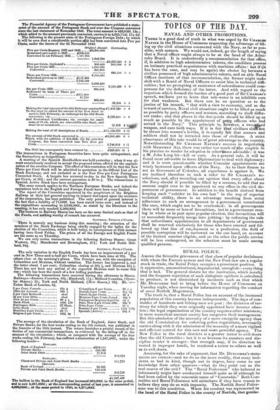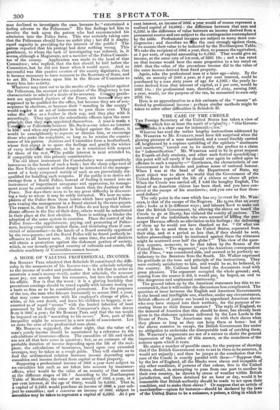RURAL POLICE.
AMONG the favourite grievances of that class of popular declaimers with whom the Factory system and the New Poor-law are a regular
stock in trade, the Rural Police occupies a prominent position. It is oppressive, unconstitutional, inquisitorial, unenglish—every thing that is bad. The general distate for the institution, which novelty and the frequent repetition of such dislogistic epithets is calculated to produce, is not diminished by incidents such as that which Mr. DUNCOMBE had to bring before the House of Commons on Tuesday night, when moving for information regarding the conduct of some Norfolk Magistrates.
The truth is, that a Rural Police has on account of the increased population of this country become indispensable. The da)s of con- stables of hundreds and tithing-men are past : the divisions of ter- ritory for which they were originally appointed have become obso- lete; the legal organization of the country requires other ministers; in mere numerical amount society has outgrown their management. But this admission of the necessity of a more energetic agency than the old Constabulary for enforcing police-regulations, necessarily carries along with it the admission of the necessity of a more vigilant and efficient control for this new and more powerful agency. The New Police in the rural districts is a greater terror to evil-doers than the old Constables ; but it is so because its numbers and dis- cipline render it stronger : that strength may, if its direction be vested in improper hands, be rendered a terror to others as well as to evil-doers.
Assuming, for the sake of argument, that Mr. DEINCOMBE'S state- ments are correct—and we do so the more readily, that many inci- dents as bad in kind, though not in degree, have come to our knowledge from other quarters—what do they point out as the real source of the evil? The "Rural Policeman" who behaved so inhumanely might have conducted himself quite as ill although he had been called by the venerable name of" Constable." Both Con- stables and Rural Policemen will misbehave if they have reason to believe they may do so with impunity. The Norfolk Rural Police- man was in this condition. When his conduct was represented to the head of the Rung Police in the county of Norfolk, that gentle- man declined to investigate the case because he "entertained a feeling adverse to the Policeman." His fine feelings led him to devolve the task upon the patron who had recommended his admission into the Police force. This was certainly taking care that the Policeman should have no unfair play ; but did it display equal sagacity in providing for the interest of the public ? The patron reported that his protégé had done nothing wrong. This gentleman, to whom the task of investigating was referred, is, it seems, although a Magistrate, not a member of the Police Commit- tee of the county. Application was made to the head of that Committee ; who replied, that the fact should be laid before the Committee, but he did not know when it would meet. And so successful was this passive evasion of the county dignitaries, that it became necessary to have recourse to the Secretary of State, and to set Mr. DONCOMBE upon him in the House of Commons to worry him into activity.
Whatever may turn out to be the merits of the complaint against the Policeman, the account of the conduct of the Magistracy is too characteristic to'admit of a doubt of its accuracy. Couary gentle- men are appointed Justices of the Peace, not becau0 they are supposed tp be qualified for the office, but because they are of con- sequence in elections, or because their "standing in the county" would reader it an act of indecorum to pass them over. They value the office as a feather in their cap, and they play with it accordingly. They appoint the subordinate officers upon the same princi le that they w e appointed themselves. A man is made a Co
ni Jo le or Police , 'because Mr. Such-a-one takes an interest in hi : and when an/complaint is lodged against the officer, it would be unneighbourly to reprove or dismiss him, or encourage those who make the complaint, so long as be retains the counte- nance of his patron. Justices and Constables form a brotherhood, whose first object is to spare the feelings and gratify the wishes
of every i i ndivideal member, as far as s consistent with respect for those of the rest. he public interest is next attended to, if compatible with this primary consideration. The old blunt instrument the Constabulary was comparatively innocuous in the hands of such a body ; but the sharp edge-tool of the New Police cannot without danger be intrusted to the manage- ment of a body composed mainly of such as are proverbially dis- qualified for handling such weapons. If the public is to derive ad- vantage from a Rural Police, instead of finding it turned into an instrument of impertinent annoyance and oppression, its manage- ment must be committed to other hands than the Justices of the Peace. Nor does there seem to be any great difficulty in discover- ing a body to whom it may be safely intrusted. We hear no com- plaints of the Police from those towns which have special Police- acts vesting the management in a Board elected by the rate-payers. The reason is, that if the Board of Police do not keep their subor- dinate officers in the line of their duty, others would be substituted in their place at the first election. There is nothing to hinder the adoption of the same system in counties. Place the control of the Police force—the appointment, paying, and promoting of Police- men, hearing complaints against them, and dismissing them if con- victed of misconduct—in the hands of a Board annually appointed by the rate-payers ; and the Rural Police will be found perfectly in- offensive to all honest men. At the same time, the rural districts will obtain a protection against the dishonest portion of society, which, in our densely-peopled country of railroads and canals, the obsolete machinery of Constables cannot bestow.
oaf



























 Previous page
Previous page